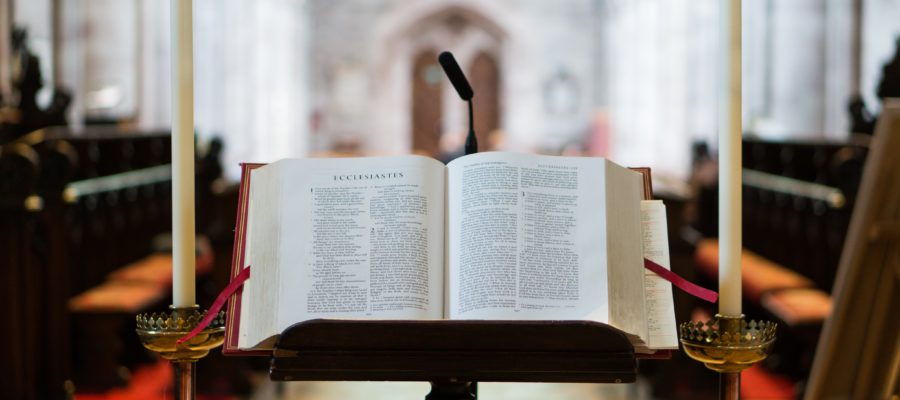Commitment to Vocation: A Theme for the New Evangelization
December 10, 2014 | Published first in Ethika Politika
co-authored by Fr. Juan Puigbó
In the past two years, many in the media have made much of various remarks by Pope Francis concerning marriage. Those who hope for changes in certain Church teachings on marriage have often pulled quotes from interviews and speeches by Francis in an effort to fuel these expectations. Thus the blithe pronouncement on the February 2014 cover of Rolling Stone Magazine: “Pope Francis: The Times They Are A-Changin.”
But some of Francis’s most compelling and clear discourses are ignored by the same press. Among them is a papal address given to seminarians and novices during a 2013 event in Vatican City. The subjects of the Pope’s speech were varied, but the overarching themes were two: commitment to one’s vocation and maintaining joy within it. From his introductory remarks:
You are now applauding, you are celebrating because it is the wedding time … But when the honeymoon is over, what happens? I heard a seminarian, a good seminarian, who said that he wanted to serve Christ for 10 years, and then he would think about starting a different life … This is dangerous!
However, listen carefully: we are all, even the older people among us, we too, are under pressure from this “culture of the temporary”; and this is dangerous because one does not put one’s stakes on life once and for all. I marry as long as love lasts; I become a woman religious, but only for “a little while …,” “a short time” and then I shall see; I become a seminarian in order to become a priest, but I don’t know how the story will end. This is not right with Jesus!
A photo of the event shows the bright-eyed joy and enthusiasm of young women in the process of preparing to make a solemn vow of fidelity to their bridegroom, Jesus Christ. The moment captured on film, and the Pope’s somewhat ominous consideration, invite the question: What can these women (and men, not shown in the photo) know of the formidable challenges to their vocation that await them on the other side of the “honeymoon”? Can they have any idea how fiercely this “culture of the temporary” will pull and tear at the bond they are preparing to forge? The Holy Father wisely counsels them to be on guard, and suggests through his use of words associated with conjugal marriage that there are powerful forces at work to destroy commitment to both vocations.
Two years ago we (the authors) started a marriage apostolate in a large suburban parish in Northern Virginia. The initiative was in large part a response to observations, by both of us, of a disturbing trend among Catholics in and around our community: men and women abandoning their spouses (all too often for extramarital affairs). Today the apostolate is thriving under the leadership of a “core team” of married couples who are dedicated to two key principles. The first is that the vocation of marriage is a tremendous gift from God that requires work—hard work. The second is that every married couple needs the positive influence of other, like-minded married couples in their lives. The broader goal is to establish a community of strong, vibrant marriages over time—men and women who support one another unconditionally in their vocations to the married life. In this way each couple serves as a role model of two characteristics that make truly happy, healthy marriages (and thus, families) possible: fidelity and permanence.
But what has this marriage endeavor to do with the priesthood and religious life? Perhaps one of the more unanticipated, repeated insights we have had in being a part of this marriage apostolate concerns the strong, and often reciprocal, connections between the vocations of married couples and those who have been called to be priests or consecrated. Priests and consecrated men and women, after all, are born and raised in families just like everyone else: some of them from intact, healthy homes; others from a brokenness that they carry with them into adulthood. Like married couples, they come to their vocations with personal weaknesses and strengths, with both sound and unrealistic expectations, with emotional, psychological and spiritual baggage from their experiences and their upbringings. As Francis noted in a November, 2014 speech: “All vocations take their first steps in the family, and bear its mark for the whole of life.”
The marriage crisis is, in essence, a crisis of fidelity. The term suggests the crisis is restricted to married couples, but this is misleading. Fidelity is a word that seems passé in this “culture of the temporary,” but it is the hinge upon which every vocation—to marriage, the priesthood, or religious life—depends. A broken vow impacts far more than one or two people; its effects reverberate through families, peers, churches, and communities over generations. Just as we’ve seen men and women walk away from their marriage vows, we have seen several local priests over the past few years abandon their priesthood. However subtle or indirect the effects, these desertions matter not only to other priests, but to married couples. Fidelity is not easy—some days we all feel like quitting. But those men and women who stand firm in their vocation through the stormy seasons of life are like a lighthouse for others in their own storms. And they often report experiencing a newfound depth and richness—a genuine, other-centered love—in the wake of the storm.
The truth is that the faithfulness of every married couple in a parish serves to encourage and strengthen the commitment of their parish priest to his vocation, and vice versa. This makes for a vibrant, healthy parish that, in turn, enriches and encourages the community, the nation, and—multiplied over millions of Catholic parishes over time—the world. In this sense, a renewed focus on the importance of fidelity to vocation should be a core component of the New Evangelization to which the Holy Father has called us.
Central to this mission, we believe, is a more holistic approach to parish life. Although married couples are the key “constituency” of the Catholic parish, seemingly few parishes have ministries devoted to keeping marriages strong and healthy. Most Catholic Churches have religious education, youth and young adult ministries, singles ministries, music ministries, and pro-life ministries. Many parishes even have ministries for the divorced. But families are the foundation of society, and strong families are built upon healthy marriages. Married couples are, in essence, the glue that holds most of the Church’s service groups together. If marriages are struggling then every one of these very worthy ministries is impacted directly. Just as seminarians, novices, priests, and religious need to be given the tools necessary to remain faithful to their vows—the practical means by which to protect their vocations—so do married couples.
Married couples, priests, and the consecrated need each other’s example and support. The ways in which this can be done are many, but the ideas put forward by Reverend Rick Warren at the Humanum conference in Rome this past November provide a wonderful starting point. Among other suggestions, he proposes asking married couples in the Church to give their testimonies on a regular basis; the encouragement of annual, public renewal of wedding vows and recognition of long-term anniversaries; speaking regularly from the pulpit about the benefits of marriage; and the creation of small group ministries in which like-minded married couples build authentic friendships in Christ. Each of these is designed, in Warren’s words, not only to defend the marriage bond, but to celebrate it.
Catholic parishes might also engage in some of the same public recognition of priestly ordinations and “anniversaries.” Dioceses might consider providing regular, candid testimonies of middle-aged and older priests during clergy retreats—and in particular on subjects relating to chastity, so that younger priests can know that they are not alone in their struggles and may receive practical advice on how to steer clear of the thought patterns and behaviors that would jeopardize their vocations (many of which patterns, like pornography, are common to married people and priests alike).
In anticipation of the Ordinary Synod on the family in 2015, Pope Francis concluded the Extraordinary Synod in October by calling for “proposed ideas” and “concrete solutions” to the “discouragements that surround and suffocate families.” In a recent letter to the Synod that we both signed (along with many other marriage advocates and scholars from around the world), 9 such proposals are made. Among them are two recommendations that highlight the vital relationship between parish priests and married couples. First, educate seminarians on social science data concerning marriage trends so that they are prepared for both the beauty and the challenges that await them in their parishes. Second, train priests to use their homilies to “showcase the spiritual and social value of marriage, contemporary challenges to it, and parish help for troubled marriages.” Research suggests that Catholics are greatly influenced by the content of their priests’ homilies: Let’s encourage priests to use this time to strengthen the resolve of their parishioners to be faithful to whatever their vocation, now or in the future.
Chesterton once observed, “The man who makes a vow makes an appointment with himself at some distant time or place. The danger of it is that he himself should not keep the appointment.”
We—priests, religious, and married—can help each other keep our “appointments” through an unwavering and enthusiastic commitment to our respective vocations.



